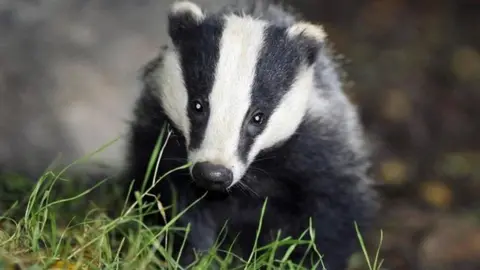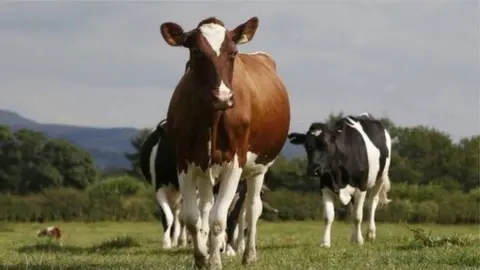Expensive badger cull should be ended, study says
 PA Media
PA MediaA badger cull intended to control bovine tuberculosis (bTB) outbreaks has not worked and should be ended, a study has suggested.
The decade-long plan that started in Gloucestershire and Somerset, has killed 140,000 badgers.
A paper released today by the Veterinary Record journal and scientists who oppose the cull, claims it "cost a fortune and saved nothing".
The government has criticised the study and said it fits a "campaign agenda".
A Department for Environment, Food and Rural Affairs (Defra) spokesperson said: "This paper has been produced to fit a clear campaign agenda and manipulates data in a way that makes it impossible to see the actual effects of badger culling on reducing TB rates.
"It is disappointing to see it published in a scientific journal."
Badgers also carry bovine TB and farmers believe they help spread it to cattle.
According to the government, independent and past "published scientifically rigorous analysis of the disease shows that licensed badger culling is helping to drive down bTB in cull areas."
 Reuters
ReutersBut Dr Mark Jones, Born Free head of policy and study co-author, said his team's finding's using the government's own data "found no evidence to support the mass killing of badgers".
"The government should at the very least be able to demonstrate a substantial and predictable disease control benefit," he said.
"[Our analysis] confirms the conclusion of scientists who oversaw extensive government research conducted between 1998 and 2005, that badger culling can make no meaningful contribution to the future control of cattle TB in Britain.
"There is no justification for killing any more badgers. It's time to bring this unscientific, inhumane and unnecessary badger culling policy to an immediate and permanent end."
Conclusions 'unjustified'
But, Professor James Wood, an independent expert in infectious diseases at the University of Cambridge, said the research "taken as a whole, seems to have failed to do what it set out to do, namely to determine what the impact of the industry led badger culling is".
"Any conclusions therefore seem unjustified," he added.
The academic claimed that data from a 20 year old randomised badger culling trial showed that the impact "was not significant in the first two years".
But it became "significant in years three and four as well as for some time after the cull".
Professor Wood said the study's authors "rightly focused" on the cyclical nature of regional bovine TB statistics.
But when it focused on county-level statistics, in which they compared "heavily" with "lightly" culled counties, the authors were comparing counties that had variable but sometimes substantial unculled areas in them.
He said that this was therefore "not a direct evaluation of culling impact and so is not particularly insightful".
Last year, the government announced seven new cull sites in Berkshire, Hampshire, Oxfordshire, Staffordshire, Worcestershire and two parts of Shropshire.
Other existing cull sites are in Cornwall, Avon, Herefordshire, Shropshire, Somerset, Warwickshire, Wiltshire and Lincolnshire.
'Cruel ineffective programme'
The paper's principal author and consulting biologist Tom Langton said beef and dairy farmers should be given support "to prevent ruined farming livelihoods".
"We have a real-world analysis, using extensive data from across England's High-Risk Area, supported by comprehensive statistical analysis."
Emma Slawinski, the RSPCA's director of advocacy and policy, said the findings "come as no surprise".
"The government should immediately call a halt to its cruel, ineffective and arbitrary programme."
Defra plans to end supplementary culling and culling by 2025 and will instead retain it as a policy option in "exceptional circumstances" to address localised flare-ups of the disease.

Follow BBC West on Facebook, Twitter and Instagram. Send your story ideas to: [email protected]
